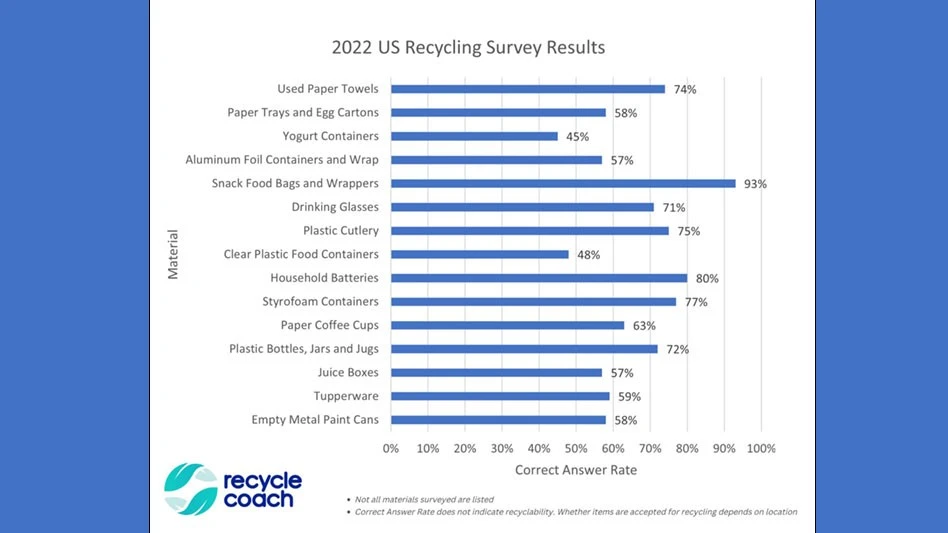
Chart courtesy of Recycling Coach
Toronto-based Recycle Coach, a digital recycling education platform used in more than 1,400 municipalities in North America, has announced the results of its survey administered to residents across the United States in September.
The survey ranged in scope from commonly recycled items, such as plastic bottles, to more challenging items, such as light bulbs.
The survey was customized for each municipality based on what is accepted in their programs. Participants were shown the correct results for the recyclability of each item based on where they live with the aim to motivate behavior change when necessary. In addition to the survey providing its own educational content for residents, Recycle Coach plans to track trends and monitor changes in consumer understanding year over year to help municipalities administer targeted recycling education on materials in which their residents lack understanding.
Recycling contamination issues
The national average for recycling contamination is estimated to be 17 percent, though contamination in some areas can reach 40 percent or more. The overall correct answer rate on this survey for residents was 74 percent, which correlates closely with contamination rate statistics.
“To combat recycling contamination, we need to learn what people do and do not understand about their local recycling programs,” Chief Revenue Officer at Recycle Coach Jeff Galad says. “People want to recycle more, and they want to recycle correctly, so we need to see where the disconnect is about their understanding, in order to make sure they get the information they need to be successful recyclers.”
Loss of material
Enhanced recycling education is the key to lowering contamination rates and increasing material recovery. The EPA has set out to increase the U.S. recycling rate from 32.1 to 50 percent by 2030. With so many residents across the country misunderstanding what is accepted in their local programs, the loss of recoverable materials is another challenge.
Materials such as plastic bottles, jugs and jars are commonly accepted in most locations, yet across the nation, only 72 percent of participants realize these items are recyclable. This means around 28 percent of residents might not be recycling these accepted plastic items, which instead are hauled to landfills.
The survey data show that more localized recycling education is needed for residents to understand their program, lower contamination rates and increase recovered recyclables.
Latest from Waste Today
- AED opposes “right to repair” language in federal bill
- UP reaches agreement to acquire Norfolk Southern
- Wisconsin county food scrap program sees success following launch
- Meridian organizes aid for flood victims
- Republic adds electric trucks, new landfill gas projects in 2024
- IEG hires general manager of service
- FZUK announces new commercial director
- Small-scale WTE partnerships





